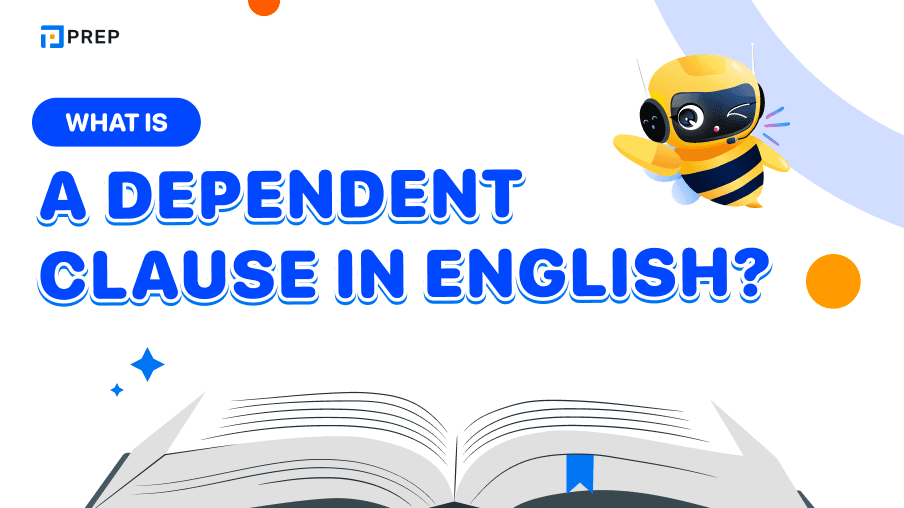Your Ultimate Guide to Understanding, and Using Dependent Clause Effectively in English
Understanding sentence structure forms the backbone of effective English communication, and a dependent clause serves as a crucial building block that transforms simple statements into sophisticated, nuanced expressions. This comprehensive guide will equip you with the knowledge to identify, understand, and skillfully employ every dependent clause in your English writing and speaking. By mastering these grammatical elements, you'll enhance your ability to convey complex ideas with clarity and precision while developing the sophisticated language skills that distinguish advanced English users.

1. What Exactly IS a Dependent Clause in English Grammar?
1.1 Definition
A dependent clause represents a fundamental grammatical structure that contains both a subject and a verb, yet fails to express a complete, standalone thought that can satisfy a reader's understanding. Unlike independent clauses that function as complete sentences, a dependent clause creates an expectation for additional information, leaving readers mentally asking "what happens next?" Consider the phrase "Because the weather was stormy" - while it contains the subject "weather" and the verb "was," this dependent clause demands completion through connection with an independent clause to form a coherent sentence such as "Because the weather was stormy, we cancelled our picnic."
This incomplete nature distinguishes a dependent clause from its independent counterparts, which can stand alone as complete sentences like "The weather was stormy." The dependent clause definition emphasizes this structural design to modify, supplement, or provide context for the main idea expressed in an independent clause.
1.2 Key Markers for Identifying Dependent Clauses
Recognizing any dependent clause becomes significantly easier when you understand that specific signal words typically introduce these structures, acting as grammatical markers that immediately indicate the clause's dependent nature.
Subordinating conjunctions serve as the primary indicators of a dependent clause, functioning as connecting words that simultaneously create the dependency relationship and establish the logical connection between the dependent clause and its accompanying independent clause. Common examples include because, although, since, while, when, if, unless, before, after, and though.
Relative pronouns create a dependent clause by performing a dual grammatical function: introducing the dependent clause while simultaneously referring back to a noun or pronoun mentioned earlier in the sentence. The most common relative pronouns include who, whom, whose, which, and that.
Relative adverbs function similarly but focus specifically on relationships involving time, place, or reason, introducing a dependent clause that modifies these particular aspects. Common relative adverbs include where, when, and why.
2. The Three Main Types of Dependent Clauses
Understanding the three main types of dependent clause provides the foundation for recognizing how these structures function within English sentences, each serving distinct grammatical purposes while contributing to overall meaning and sophistication.
2.1 Adjective Clauses: Adding Descriptive Detail
An adjective dependent clause modifies nouns or pronouns by providing additional information that helps readers understand which specific person, place, thing, or idea the writer intends to discuss. This type of dependent clause answers questions like "which one?" or "what kind?" while maintaining the grammatical structure of subject-verb combinations.
An adjective dependent clause typically begins with relative pronouns (who, whom, whose, which, that) or relative adverbs (where, when, why), and immediately follows the noun or pronoun it modifies. Understanding the distinction between essential and non-essential adjective dependent clause structures proves crucial for both meaning and punctuation accuracy.
|
Type |
Function |
Punctuation |
Example |
|
Essential |
Identifies which specific noun |
No commas |
Students who study regularly earn better grades |
|
Non-essential |
Adds bonus information |
Commas required |
My brother, who lives in Seattle, is visiting |
2.2 Adverb Clauses: Providing Context and Modifying Action
An adverb dependent clause modifies verbs, adjectives, or other adverbs by providing contextual information about how, when, where, why, to what extent, or under what conditions the action occurs. This type of dependent clause expands the reader's understanding of circumstances surrounding the main action described in the independent clause.
An adverb dependent clause consistently begins with subordinating conjunctions that signal the specific relationship between clauses. When an adverb dependent clause appears at the beginning of sentences, it requires a comma to separate it from the independent clause: "When the concert ended, the audience gave a standing ovation." When this dependent clause follows the independent clause, commas are typically unnecessary: "The audience gave a standing ovation when the concert ended."
Dependent clause examples of various relationships include:
-
Time: "Before you submit your essay, proofread it carefully"
-
Cause: "Because the library was closed, we studied at home"
-
Condition: "If you arrive early, you'll get better seats"
-
Contrast: "Although the weather was cold, we enjoyed our hike"
2.3 Noun Clauses: Acting as a Noun within the Sentence
A noun dependent clause performs the grammatical functions typically associated with nouns - serving as subjects, direct objects, predicate nominatives, or objects of prepositions - while maintaining its internal structure as a dependent clause with subjects and verbs. This dual nature makes a noun dependent clause particularly sophisticated grammatical tools.
A noun dependent clause often begins with words like that, what, who, when, where, why, how, whether, and if. Unlike adjective and adverb clauses that modify other sentence elements, a noun dependent clause replaces what would otherwise be simple nouns in sentence structures.
Consider these functions: "What you discovered will influence our decision" (subject), "The committee announced that the deadline had been extended" (direct object), and "The question is whether we should proceed immediately" (predicate nominative).
3. Independent vs. Dependent Clauses
3.1 Defining the Independent Clause
An independent clause contains a subject and verb combination that expresses a complete thought capable of standing alone as a sentence, requiring no additional information to satisfy the reader's understanding. Independent clauses function as the foundation upon which more complex sentence structures are built, providing the essential meaning that any dependent clause enhances or supplements.
3.2 Key Differences and Sentence Building
|
Aspect |
Independent Clause |
Dependent Clause |
|
Completeness |
Complete thought |
Incomplete thought |
|
Stand alone |
Yes |
No |
|
Typical starters |
Various words |
Subordinating words |
|
Function |
Main message |
Supporting information |
Understanding how these clauses combine creates different sentence types:
-
Simple sentences: One independent clause ("The storm damaged buildings")
-
Complex sentences: One independent plus one dependent clause ("Although the storm was severe, residents had prepared")
-
Compound-complex sentences: Multiple independent clauses plus at least one dependent clause ("The storm caused damage, and cleanup began because volunteers organized quickly")
4. Why Mastering Dependent Clauses Elevates Your English Proficiency
Mastering every dependent clause transforms your English communication from basic to sophisticated, enabling you to express complex relationships between ideas with precision and elegance. This knowledge provides five key benefits that distinguish advanced language users.
-
Enhanced Expression Capability allows you to combine multiple related ideas within single sentences, creating sophisticated prose that demonstrates advanced dependent clause control while maintaining clarity. Instead of relying on choppy, disconnected simple sentences, you can weave complex relationships between concepts seamlessly through skillful dependent clause usage.
-
Improved Clarity and Precision through proper use of each dependent clause eliminates ambiguity by establishing clear logical relationships between ideas, helping readers understand cause-and-effect relationships, temporal sequences, and conditional scenarios without confusion.
-
Enhanced Reading Comprehension develops when you recognize every dependent clause in sophisticated texts, enabling you to deconstruct complex sentences effectively and identify main ideas and supporting details while understanding how authors structure arguments.
-
Error Prevention occurs naturally as understanding dependent clause structure helps you avoid common mistakes like sentence fragments, run-on sentences, and punctuation errors that result from misunderstanding clause relationships.
-
Foundation for Advanced Grammar emerges as mastery of dependent clause structures provides groundwork for understanding more complex grammatical concepts, including advanced punctuation rules, parallel structure, and sophisticated rhetorical techniques that characterize professional writing.
5. Frequently Asked Questions & Advanced Insights
5.1 Can a sentence consist of only a dependent clause?
No, a sentence cannot consist solely of a dependent clause because such constructions create sentence fragments that fail to express complete thoughts. A dependent clause standing alone leaves readers expecting additional information, violating the fundamental requirement that sentences communicate complete ideas.
5.2 What distinguishes a dependent clause from a prepositional phrase?
The fundamental difference lies in internal structure: a dependent clause contains both subjects and verbs, while prepositional phrases consist of prepositions followed by nouns without verb components. Dependent clause examples like "when the meeting ends" contrast with prepositional phrases like "after the meeting" in their grammatical complexity.
5.3 How do reduced adverb clauses function?
Reduced adverb clauses result from omitting the subject and auxiliary verb when the dependent clause shares the same subject as the independent clause. "While I was studying" reduces to "While studying," maintaining the adverbial function while streamlining sentence structure.
Transitioning from theoretical knowledge to practical mastery requires conscious practice in identifying and constructing every dependent clause within your own writing and speaking. Regular application strengthens your ability to recognize opportunities for combining simple ideas into sophisticated expressions while maintaining clarity through effective dependent clause implementation.
Your mastery of dependent clause usage demonstrates sophisticated grammatical control that elevates your English communication to professional and academic standards, enabling you to express complex ideas with precision and elegance that characterizes advanced language proficiency. This grammatical foundation supports your continued development toward truly masterful English expression through confident dependent clause application.

Hi I'm Chloe, and I am currently serving as an Product Content Administrator at Prep Education. With over five years of experience in independent online IELTS study and exam preparation, I am confident in my ability to support learners in achieving their highest possible scores.
Comment
Premium content
View allPersonalized roadmap
Most read












